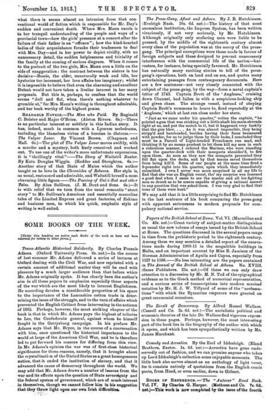The Press-Gang, Afloat and .Ashore. By J. R. Hutchinson. (Eveleigh
Nash. 10s. 6d. net.)—The history of that most anomalous institution, the Impress System, has been written vivaciously, if not very seriously, by Mr. Hutchinson. Although originally only seafaring men were liable to be pressed, by the middle of the eighteenth century almost every class of the population was at the mercy of the press- gang. The principal exemptions were those made in favour of foreign subjects and those designed to prevent unnecessary interference with the commercial life of the nation—har- vesters, for instance, being specially favoured. Mr. Hutchinson has naturally many exciting stories to tell of the press- gang's operations, both on land and on sea, and quotes many entertaining passages from contemporary documents. Here are a few sentences—not very closely connected with the subject of the press-gang, by the way—from a naval captain's letter of 1743. Captain Brett of the Anglesea,' cruising down Channel, bad fallen in with a suspicious-looking ship and given chase. The strange vessel, instead of obeying Captain Brett's summons to heave to, fired repeatedly at the Anglesea,' which at last ran close under her stern,
"Just as we came under his quarter," writes the captain, he pointed a gun that was sticking out a little abaft his main-shrouds right at us, and put the match to it, but it happened very luckily that the gun blew. . . . As it was almost impossible, they being stripp'd and bareheaded, besides having their faces besmeared with powder, for us to judge them by their looks, I concluded they must be a Parcell of Light-beaded Frenchmen run mad, and thinking it by no means prudent to let them kill my men in such a ridiculous manner, I ordered the Marines, who were standing upon the quarter-deck with their musquets shoulder'd, to fire upon them. As soon as they saw the musquets presented they fell flat upon the decks, and by that means saved themselves from being kill'd. Some of our people at the same time fired a 9-pounder right into his quarter, upon which they immediately submitted. I own I never was more surprised in all my life to find that she was an English vessel, the' my surprise was lessened a good deal when I came to see the master and all his fighting men so drunk as to be scarce capable of giving a rational answer to any question that was asked them. I was very glad to find that none of them were hurt."
We may add that it is a little surprising to find Mr. Hutchinson in the last sentence of his book comparing the press-gang with apparent seriousness to modern proposals for com-.
pulsory national service.






























































 Previous page
Previous page